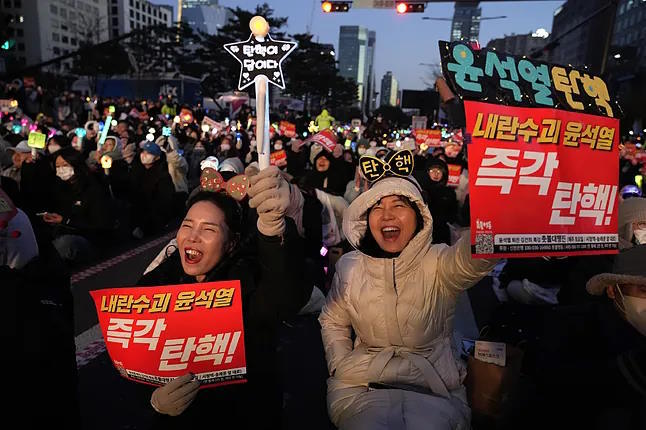After his own party sidelined him and de facto removed him from his presidential duties as a measure to force his resignation, Yoon Suk Yeol, leader of South Korea, is increasingly cornered by the Justice system. This Monday, authorities have reported that he has been prohibited from leaving the country as the investigation into a possible treason offense progresses following last week's brief declaration of martial law.
Yoon survived the Saturday impeachment process presented by the opposition in the Parliament. His party boycotted the vote. But the intention of the ruling People Power Party (PPP) is not to save the president, but rather to manage the timing and prevent their political rivals from taking credit for expelling the leader who turned the country into a military regime for six hours by sending the army to take control of the Legislature.
On Sunday, the leader of his party, Han Dong-hoon, announced that the besieged president will no longer participate in the country's management or diplomacy. "We will resolve the political situation by the prompt resignation of the president in an orderly manner. At this moment, Yoon is no longer involved in state affairs," stated Han.
A unilateral decision that has been heavily criticized because it is not based on any legal grounds. In other words, the PPP cannot decide to remove the president, who has not formally resigned, nor has he been impeached or arrested, and appoint the Prime Minister, Han Duck-soo, to lead South Korea, although it is not very clear who is currently in charge.
This unusual move has been described by the opposition, which controls the Parliament with a large majority after sweeping the legislative elections earlier this year, as a "second coup d'état" by the PPP. The opposition has already announced that they will present a new impeachment process this Wednesday to be voted on in Parliament next Saturday.
"It is clearly unconstitutional for the Prime Minister and the ruling party to jointly exercise the authority of the president that no one has granted them without participating in the constitutional procedure," said Woo Won-shik, President of the National Assembly.
According to the Constitution of South Korea, the president remains the head of the Government and commander-in-chief of the army unless incapacitated or resigns. The PPP argues that it is perfectly compatible and legal for Yoon to remain in office while delegating his powers to the Prime Minister.
The failed motion of censure presented by the opposition was based on the argument that during martial law, the mobilization of the armed forces and the attempt to paralyze the functions of Parliament constituted "acts of treason." For this reason, former Defense Minister Kim Yong-hyun, who had resigned a few days earlier, was arrested yesterday.
A team of 120 investigators led by Park Se-hyun, head of the Seoul Prosecutor's Office, is now investigating whether Yoon's actions constituted treason and insurrection, offenses for which the president would not have immunity and are punishable by death.
